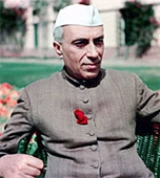
who became the first Prime Minister
of independent India (1947–64) and became noted for his “neutralist” policies in foreign affairs. He was also one of the principal leaders of India’s independence movement
in the 1930s and ’40s. Nehru was elected by the Indian National Congress
to assume office as independent India's first Prime Minister, and re-elected when the Congress Party won India's first general election in 1951 and 1952
.
Great causes and little men go ill together.![]()
Most of us seldom take the trouble to think. It is a troublesome and fatiguing process and often leads to uncomfortable conclusions. But crises and deadlocks when they occur have at least this advantage, that they force us to think.![]()
Because we have sought to cover up past evil, though it still persists, we have been powerless to check the new evil of today. Evil unchecked grows, Evil tolerated poisons the whole system. And because we have tolerated our past and present evils, international affairs are poisoned and law and justice have disappeared from them.![]()
Wars are fought to gain a certain objective. War itself is not the objective; victory is not the objective; you fight to remove the obstruction that comes in the way of your objective. If you let victory become the end in itself then you've gone astray and forgotten what you were originally fighting about.![]()
If in the modern world wars have unfortunately to be fought (and they do, it seems) then they must be stopped at the first possible moment, otherwise they corrupt us, they create new problems and make our future even more uncertain. That is more than morality; it's sense.![]()

